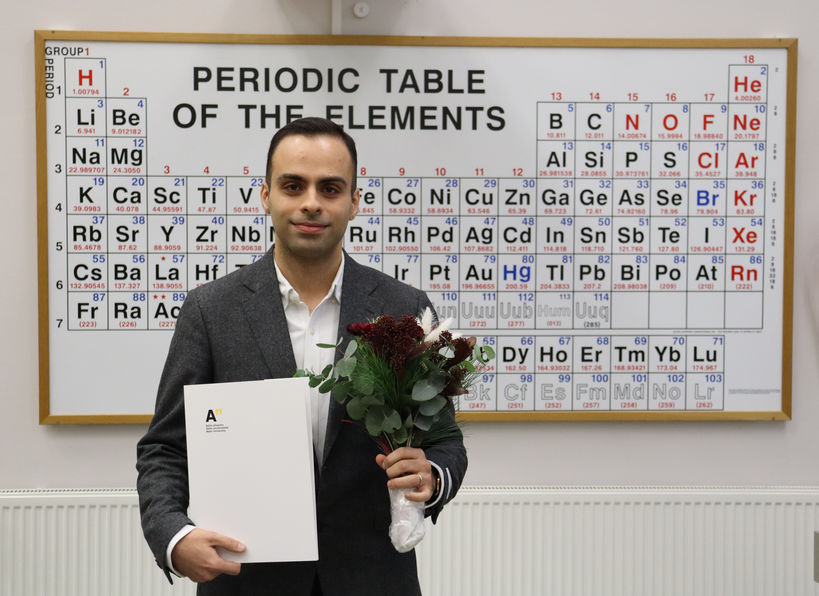Research Careers in Finland: Erfan Kimiaei was Inspired by Finnish Forests
Case - Published 13.2.2025
Erfan Kimiaei’s journey blends expertise in polymer engineering with a passion for sustainability. From his PhD research on Finland’s wood-based materials to his new role in industry, he is driven by the motivation to make a meaningful impact.
Dr. Erfan Kimiaei holds a background in polymer engineering, specializing in paint and coating technology. His academic journey in Europe began when he was accepted into the European Institute of Innovation and Technology (EIT) double-degree master’s program. He chose Aalto University in Finland as his base for the first year, spent six months in France, and returned to Finland to complete his master’s thesis.
For the past two years, Kimiaei worked as a researcher at Aalto University on an industry-led project focusing on flexible barrier packaging, collaborating with partners from the UK, USA, and Canada. However, he recently started new position as a product development engineer in Amcor.
In this new position, he will oversee research and development (R&D) projects within the EMEA region, while collaborating with sales and marketing teams to drive profitable growth through various R&D initiatives.

PhD Fueled by Wood-Based Innovations
Kimiaei’s academic journey began with a master’s in material science, where he explored sustainability and entrepreneurship. This passion led him to pursue a PhD in the forest sector, researching natural wood components as sustainable alternatives to plastics.
“The vast forests in Finland inspired me when I realized they’re more than just a backdrop; they’re woven into the fabric of daily life,” Kimiaei recalls.
“This became evident through the extensive use of wood in industries like pulp and paper, construction, textiles, and packaging. It highlights the incredible potential of this renewable resource.”
Motivated by Sustainability
In addition to technical advancements, Kimiaei emphasizes the importance of sustainability by understanding materials’ end-of-life scenarios and life cycle assessments. He says that utilizing renewable resources like wood-based materials reduces dependence on fossil fuels, contributing to environmental conservation.
“I believe the forest sector and bioeconomy are poised for significant transformation in the coming decades, driven by the growing global demand for sustainable solutions and increased awareness of environmental challenges,” he explains.
“This evolution, however, will come with challenges. It will require navigating trade-offs carefully to ensure environmental, social, and economic benefits without unintended consequences.”
The Importance of a Diverse Skill Set for Researchers
Kimiaei highlights the importance of combining technical, analytical, and soft skills. His typical workweek involves conducting experiments, writing and documenting tasks, managing equipment, and meeting with industrial and academic partners.
Problem-solving, critical thinking, and communication are three core skills he considers essential for researchers.
“Researchers need to analyze information objectively, identify biases, evaluate evidence, and synthesize complex ideas,” he says.
He notes that these skills can be improved by questioning assumptions, exploring problems from multiple perspectives, and engaging with peers, mentors, and collaborators.
Kimiaei adds that conducting experiments using different methodologies and embracing trial-and-error has made problem-solving more intuitive during his doctoral studies.
Advice for Future Researchers
For students considering a career in this field, Kimiaei advises prioritizing the commercialization and scalability of their research from the outset. While a strong scientific foundation is critical, researchers should focus on how their work can translate into real-world solutions.
“With the bioeconomy evolving rapidly, continuous learning is essential. Networking and collaboration are also important. Building connections with researchers outside your workplace and industry can provide valuable insights and open new opportunities,” he adds.
Life in Finland
Despite initial concerns about Finland’s long, dark winters and language barriers, Kimiaei found out that the positives of living in Finland far outweighed the challenges.
“I value the supportive and respectful working environment, as well as the well-organized systems, trust, and safety in both daily life and the workplace,” he says.
Having moved to Finland from abroad, Kimiaei is well aware of what needs to be done to retain international professionals and students.
“I strongly believe Finland can do more to attract and retain global talent, ensuring they stay after graduation rather than moving elsewhere to apply their knowledge. This requires creating a more welcoming environment and fostering better societal integration, much like countries that excel in making international talents feel at home,” he concludes.
Throughout winter, Biotalous.fi is sharing career stories from researchers in the bioeconomy sector. #ResearchCareersInFinland
Writer of the article is Selma Salin, editor of Biotalous.fi, selma.salin(at)tapio.fi
